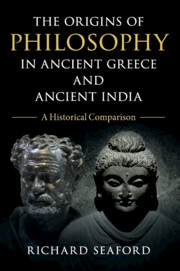Book contents
- The Origins of Philosophy in Ancient Greece and Ancient India
- The Origins of Philosophy in Ancient Greece and Ancient India
- Copyright page
- Contents
- Preface
- The Ancient Texts
- Translations
- Anglicisation of Sanskrit
- Abbreviations
- Part A Introductory
- Part B The Earliest Texts
- Part C Unified Self, Monism and Cosmic Cycle in India
- Chapter 5 The Economics of Sacrifice
- Chapter 6 Inner Self and Universe
- Chapter 7 The Powerful Individual
- Chapter 8 The Formation of Monism
- Chapter 9 The Hereafter
- Chapter 10 Reincarnation and Karma
- Part D Unified Self, Monism and Cosmic Cycle in Greece
- Part E Conclusion
- Bibliography
- Index of Principal Ancient Passages
- Index
Chapter 8 - The Formation of Monism
from Part C - Unified Self, Monism and Cosmic Cycle in India
Published online by Cambridge University Press: 14 November 2019
- The Origins of Philosophy in Ancient Greece and Ancient India
- The Origins of Philosophy in Ancient Greece and Ancient India
- Copyright page
- Contents
- Preface
- The Ancient Texts
- Translations
- Anglicisation of Sanskrit
- Abbreviations
- Part A Introductory
- Part B The Earliest Texts
- Part C Unified Self, Monism and Cosmic Cycle in India
- Chapter 5 The Economics of Sacrifice
- Chapter 6 Inner Self and Universe
- Chapter 7 The Powerful Individual
- Chapter 8 The Formation of Monism
- Chapter 9 The Hereafter
- Chapter 10 Reincarnation and Karma
- Part D Unified Self, Monism and Cosmic Cycle in Greece
- Part E Conclusion
- Bibliography
- Index of Principal Ancient Passages
- Index
Summary
Chapter 8 describes the development of the various forms of monism (material, personal, mental, abstract) after the Rigveda. The traditional correspondences, between ritual and what ritual controls, tend to collapse into a single identification, of subject with object, making for the prominence and coalescence of mental monism and abstract monism in the early Upanishads – under the influence of universal abstract value. Awareness of the unity of all things (monism) is associated with immortality. The monistic tendency is illustrated by focus on a single passage of the Chandogya Upani?ad.
- Type
- Chapter
- Information
- The Origins of Philosophy in Ancient Greece and Ancient IndiaA Historical Comparison, pp. 143 - 166Publisher: Cambridge University PressPrint publication year: 2019

